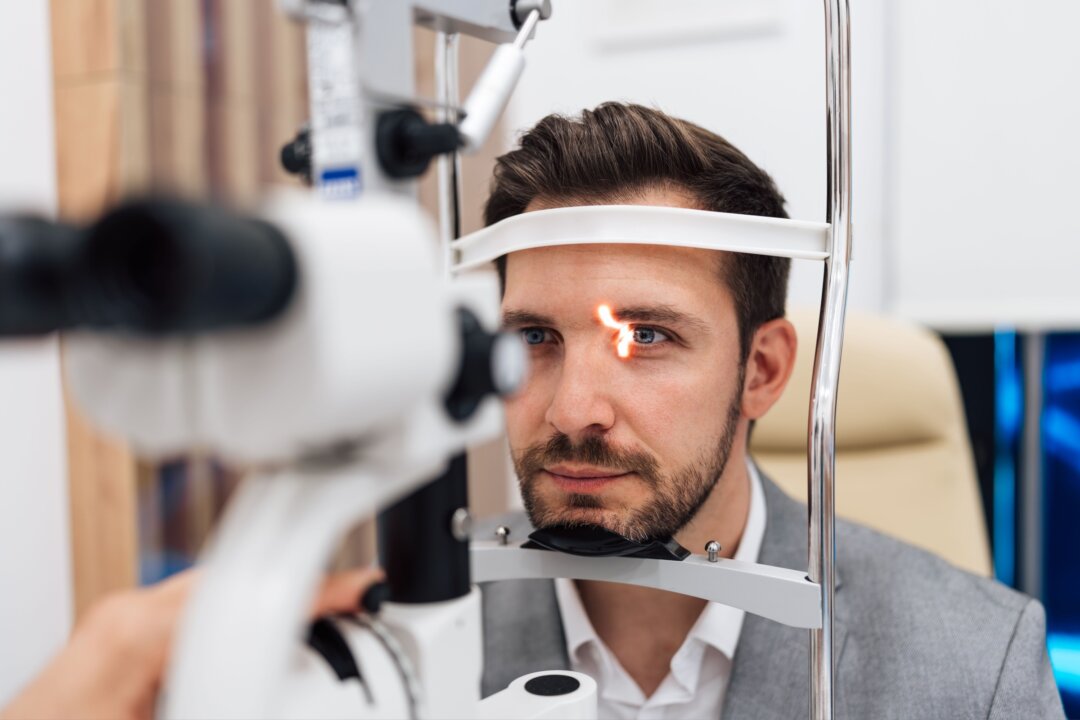When Dr. Edward Kondrot first asks his patients,“What did you do this summer?”—it’s not small talk—it’s part of his exam. An ophthalmologist and homeopathic doctor, Kondrot wants to get to know his patients’ dispositions and immediate struggles.
Those who launch into grumbles and complaints are likely under stress—one of many factors that he said can affect their vision. His “get to know you” questions continue through daily habits, work, and even digestion. How patients think and their lifestyle decisions factor into both gut and eye symptoms, which are more interconnected than most people realize, Kondrot said in an interview with The Epoch Times.

“The more I know about you, the more I can treat your eyes,” he noted. “Most eye doctors are just focused on the eye—what’s going on in the eye, what eyedrop, surgical procedure, or injection they can do. You need to look outside the realm of the eye.
You have to be a detective when you look at eye diseases. What goes on in the gut is reflected in the eye.” But researchers have also connected intestinal permeability to dysbiosis, which is linked to compromised health in other body locations, the review said.
One location is the ocular mucosa—the barrier that protects the eye against allergic, inflammatory, and infectious invasion. This interface is also known at the gut-eye axis. “Loss of intestinal barrier integrity and increased vascular permeability allow bacterial translocation and their products into the bloodstream, leading to passage across the blood-retinal barrier,” according to the review.
Bacteria products are lipopolysaccharides, commonly referred to as endotoxins, that cause chronic inflammation. Researchers don’t know the exact mechanics involved in diseases linked through the gut-eye axis, though the review noted several theories that involve an interaction between microbes and immune cells, which could cause some people to have more intestinal permeability than others. Activated immune cells, endotoxins, and pathogenic bacteria that escape the intestine are capable of reaching the eye, where a number of inflammatory responses can take place and damage the eyes, according to the review.
Age-related macular degeneration , in which the macula that gives fine detail to sight deteriorates. Diabetic retinopathy , which involves the swelling and leaking of fluids in the eye that can lead to retinal detachment. Some retinal dystrophies , a group of inherited disorders that cause progressive vision loss secondary to retinal degeneration.
The findings of the review noted that patients with diabetic retinopathy had a reduction in diversity in their microbiome, which can have more than 1,500 different microbial species. Diversity of gut bugs has been associated with better gut and overall health. Modern practices are leading to the destruction of microbes from both topsoil and the human microbiome.
That includes the heavy use of pesticides on soil and hygiene practices in response to what Kondrot described as “germaphobia.” We kill our good bugs when we engage in habits like the overuse of hand sanitizer and misusing antibiotics for infections that don’t require them, he said. Germaphobia can also include avoiding contact with other people, animals, and the soil—all of which can be sources of health-boosting microbes.
Authors of the Microbial Pathogenesis review noted that gut-eye axis findings imply that re-establishing gut microbial homeostasis could prevent or treat diabetic retinopathy. “Factors such as probiotics, glucose-lowering medications, and dietary habits have been shown to influence the gut microbiome of patients with diabetic retinopathy,” they wrote. “It all comes down to diet.
Sugar is a poison, and sugar is changing the whole configuration of our gut. The average child’s sugar consumption, it’s a nightmare,” he said. “Food is our best medicine.
You’ve got to change your diet. If it has a label on it, don’t eat it. You’ve got to get more natural food.
” Reduce screen use , including television Play sports , which improve peripheral vision Avoid seed oils , which are inflammatory Homeopathy, developed in Germany, is a form of alternative medicine that involves using highly diluted substances based on the principle that “like cures like.” For instance, a patient experiencing symptoms thought to be caused by high levels of mercury might be treated with a highly diluted form of mercurius. Kondrot added that sometimes medicine and surgery offer the best options for patients.
He performs many surgeries in impoverished areas in West Africa, where he said the lack of adequate nutrition often makes surgery the best option. Nutrition, while more accessible in the United States, can still be complicated for patients to navigate because doctors don’t receive much training in it. Food continues to become inundated with complex ingredients and toxic practices, he said.
Because of the bombardment of chemicals that are not only in the food supply but also in the environment, poor gut and eye health are in a “dire situation,” he said. “That’s why we are getting sicker and sicker. We have a long way to go,” he summed up.
“It is possible to cure disease, if you have the right approach. If we understand disease dynamics, we can really help the patients and reverse disease.”.


















